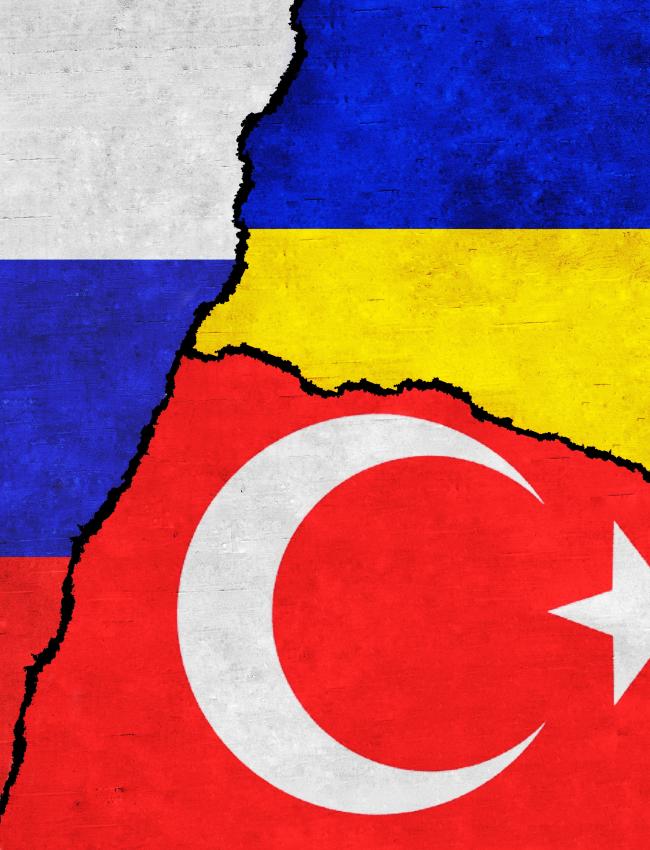Though this happened to be on a left-wing opposition channel, susceptible to Russia’s narrative on Ukraine, sentiments on the pro-government media seemed no less anti-Western. Analysts on government-sanctioned mainstream networks framed the war as a showdown between NATO and Russia, as opposed to an illegal assault on a sovereign nation. And while there was plenty of sympathy for Volodymyr Zelensky and the Ukrainian people, the default position seemed to be to blame NATO for everything.
There were also plenty of headlines on how the evil West was discriminating against Africans trapped in Ukraine or favoring White Ukrainians over Syrian Muslims. The messaging was clear: Russia is bad, but the West is evil, too.
None of this is surprising.
Except for the period of E.U. accession negotiations, anti-Western sentiment has been common in Turkey across the political spectrum, even though the country has been firmly in the transatlantic camp since World War II and a NATO member since 1952. The failed coup attempt in 2016 has made it all worse, legitimizing anti-Westernism in the official parlance.
The irony is that Turkey is in the West. Despite the authoritarian lurch and recent flirtations with Russia, it is still a critical NATO country and has a complicated relationship with Russia.
Moreover, Ankara has recently stepped up its engagement with NATO and has been supplying Ukraine with armed drones, the crown jewel of Turkey’s defense industry. These drones have been used effectively by Ukrainian military to slow down the Russian advance over the past week and have become a popular symbol of Ukraine’s resilience against invaders. Ankara has also restricted further Russian navy access to the Black Sea by imposing wartime clauses of the 1936 Montreux Convention that regulates the maritime traffic on the Turkish straits.
So why then is Turkish President Recep Tayyip Erdogan saying things such as “we can neither give up on Ukraine nor on Russia”? Why did Turkey abstain from a decision to suspend Russia’s seat in the Council of Europe but sponsor a resolution at the U.N. General Assembly condemning “aggression against Ukraine”?
A sense of strategic ambiguity seems to be at the heart of Turkey’s balancing act with Russia. Turkish decision-makers are no doubt alarmed by a revisionist Russia that is controlling Syria, has expanded its military footprint in the Caucasus and is now threatening to overtake Turkey’s northern flank across the Black Sea. Turkey and Russia are historic rivals and have been fighting in opposite sides of the conflicts in Libya and Syria. Erdogan’s Russia-romanticism died after Russian and Syrian planes killed 34 Turkish soldiers in Idlib, Syria, two years ago. Now Putin’s recklessness is on full display.
But Turkey is unwilling to antagonize Putin — at least not with a firm offer from the West.
Erdogan has made Turkey economically and strategically vulnerable to Russia, and he knows that Turkey’s ability to operate in Syria is based on Putin’s consent. There is also Russian gas, Russian tourists and Russian investments. This has made an already uncomfortable relationship unnerving for Turkey.
“If there is to be a new cold war, there is no doubt about where we stand,” a senior Turkish official told me. But he prefaced that comment with criticism of the United States for cold-shouldering Turkey and Erdogan.
My guess is that the Erdogan wants to pivot to the West, but not necessarily return to a club of democracies. He wants an end to the social distancing by the Biden administration but doesn’t want to change his domestic conduct in ways that could challenge his leadership at home.
In 1945, Turkish leaders threw their lot with the West because they feared Stalin’s Russia and wanted to be on the right side of history. As part of that deal, then-President Ismet Inonu accepted a multiparty system and Turkey’s entry into transatlantic institutions. On net balance, all of that was good for Turkey.
Faced with the same dilemma, Erdogan should similarly do what is best for Turkey: move us back to democracy and the transatlantic security order. A new engagement can start with baby steps to break Ankara’s isolation. Opening negotiations with the Biden administration on the S-400 missile defense system or releasing symbolic names such as civil society leader Osman Kavala would open doors in Washington and Europe.
I hope both Turkey’s leaders and its opposition understand that the West reconstituting itself. I hope they are pragmatic enough to pick the right side, despite the moral confusion in Turkey’s media. And I hope that, like in 1945, a grand bargain with Turkey will involve democratization.
Because the alternative for Ankara is being left with Putin, and that certainly is unsafe.
Washington Post -Aslı Aydintasbas
